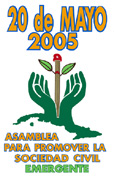|
Home
|
Assembly Meets, Did fidel Overreact? Will EU sanction Cuba? Robert at The 26th Parallel has been translating some of the groups Spanish news releases into English. The Miami Herald has a full story including photographs" The unprecedented reunion of the Assembly to Promote Civil Society was deemed a success by organizers and supporters, including a personal message sent by President Bush. The two-day conference, which ends today, was organized to join government opponents on and off the island and sketch out ideas for a future democratic society. ''There will be a before and after for May 20 in Cuba,'' Martha Beatriz Roque, one of the main organizers, told reporters in Havana. ''This is a triumph for all the opposition.'' May 20 is Cuba's independence day. fidel didn't miss his chance to cause trouble, though. He expelled Czech, German and Polish legislators who came to Cuba as observers. He arrested and expelled reporters from Poland and Italy. The governments of Spain and Italy summoned Cuba's ambassadors to those countries. Some delegates to the European Union say they should respond to fidel's tactics by restoring economic sanctions. Wired News, The Scotsman, The Guardian, and The Kansas City Star all have stories, as does CNN. And OMG, the real Glenn Reynolds links to Stephania and Babalu. The Star has another interesting article comparing a Cuban flea market to the Cuba Nostalgia convention in Miami. When the Orthodox Church announced it was sponsoring a fun-filled, five star hotel staying, five star hotel food eating trip to Cuba, it said the folks going could go to Cuban flea markets. I asked what was sold in a Cuban flea market. The Star answers. People's memories and family keepsakes are sold to get enough money for food. More than half a century of Cuban history can be traced in the clutter of the market's collectibles and tchotchkes. Tropicana swizzle sticks, Capri casino chips, 3-D comic books and 1950s lottery tickets recall Havana's heyday. There are rusted La Estrella bonbon tins and Pan American Airways flight maps advertising Miami-Havana trips. Pocket watches from the pre-revolutionary Cuban jeweler Cuervo y Sobrinos are lined up near 1940s voter ID cards and 100-peso bonds from the Guantanamo Railway. "No one pays for what things are worth," said Havana vendor Arnaldo Rodriguez, 42. "Why? Because the owner needs to buy food. A generation has died and those who are left behind don't know the value of their things." Life in an island worker's paradise. |
 People around the world are reacting to The Assembly To Promote A Civil Society In Cuba meeting that began in Havana yesterday. The organization is discussing how to have a free and democratic government in Cuba.
People around the world are reacting to The Assembly To Promote A Civil Society In Cuba meeting that began in Havana yesterday. The organization is discussing how to have a free and democratic government in Cuba.